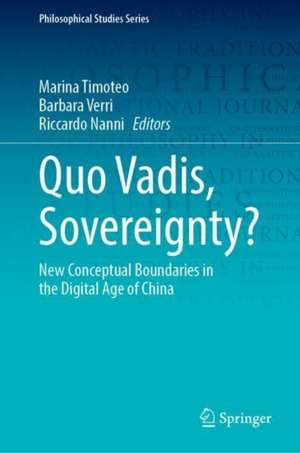Quo Vadis, Sovereignty?: New Conceptual and Regulatory Boundaries in the Age of Digital China: Philosophical Studies Series, cartea 154
Editat de Marina Timoteo, Barbara Verri, Riccardo Nannien Limba Engleză Hardback – noi 2023
Din seria Philosophical Studies Series
-
 Preț: 407.78 lei
Preț: 407.78 lei - 15%
 Preț: 644.95 lei
Preț: 644.95 lei - 18%
 Preț: 1120.18 lei
Preț: 1120.18 lei - 18%
 Preț: 1005.43 lei
Preț: 1005.43 lei - 15%
 Preț: 640.06 lei
Preț: 640.06 lei -
 Preț: 381.21 lei
Preț: 381.21 lei -
 Preț: 391.61 lei
Preț: 391.61 lei - 15%
 Preț: 640.88 lei
Preț: 640.88 lei - 15%
 Preț: 639.25 lei
Preț: 639.25 lei - 18%
 Preț: 1221.51 lei
Preț: 1221.51 lei - 18%
 Preț: 947.18 lei
Preț: 947.18 lei - 18%
 Preț: 955.56 lei
Preț: 955.56 lei - 18%
 Preț: 950.96 lei
Preț: 950.96 lei - 15%
 Preț: 645.47 lei
Preț: 645.47 lei - 15%
 Preț: 635.79 lei
Preț: 635.79 lei - 15%
 Preț: 644.82 lei
Preț: 644.82 lei - 18%
 Preț: 950.66 lei
Preț: 950.66 lei -
 Preț: 386.00 lei
Preț: 386.00 lei - 15%
 Preț: 644.82 lei
Preț: 644.82 lei - 15%
 Preț: 642.18 lei
Preț: 642.18 lei - 15%
 Preț: 643.48 lei
Preț: 643.48 lei - 18%
 Preț: 944.99 lei
Preț: 944.99 lei - 15%
 Preț: 638.76 lei
Preț: 638.76 lei - 20%
 Preț: 553.25 lei
Preț: 553.25 lei - 20%
 Preț: 560.31 lei
Preț: 560.31 lei - 18%
 Preț: 951.29 lei
Preț: 951.29 lei - 18%
 Preț: 893.40 lei
Preț: 893.40 lei - 20%
 Preț: 566.76 lei
Preț: 566.76 lei - 18%
 Preț: 951.77 lei
Preț: 951.77 lei
Preț: 729.68 lei
Preț vechi: 889.85 lei
-18% Nou
Puncte Express: 1095
Preț estimativ în valută:
139.64€ • 151.63$ • 117.30£
139.64€ • 151.63$ • 117.30£
Carte tipărită la comandă
Livrare economică 22 aprilie-06 mai
Preluare comenzi: 021 569.72.76
Specificații
ISBN-13: 9783031415654
ISBN-10: 3031415655
Pagini: 222
Ilustrații: X, 222 p. 2 illus.
Dimensiuni: 155 x 235 mm
Greutate: 0.5 kg
Ediția:1st ed. 2023
Editura: Springer Nature Switzerland
Colecția Springer
Seria Philosophical Studies Series
Locul publicării:Cham, Switzerland
ISBN-10: 3031415655
Pagini: 222
Ilustrații: X, 222 p. 2 illus.
Dimensiuni: 155 x 235 mm
Greutate: 0.5 kg
Ediția:1st ed. 2023
Editura: Springer Nature Switzerland
Colecția Springer
Seria Philosophical Studies Series
Locul publicării:Cham, Switzerland
Cuprins
Introduction.- 1. Cyber/information Sovereignty and the Internet’s first Decade in China: Academic debates and the official Bu Zhenglun.- 2. An analysis the evolution of “Network sovereignty” and “information sovereignty” in China from 2005 to 2014.- 3. ourney to the East: Digital Sovereignty in China’s East Asian Relations Through the Lens of Techno-Nationalism. The Mobile Telecommunications Case-Study.- 4. Digital Sovereignty, Digital Expansionism, and the Prospects for Global AI Governance.- 5. Chinese Cybersecurity Policies in the Age of Cyber Sovereignty.- 6. “One city, two networks”: Big Data and artificial intelligence for smart public governance in Shanghai.- 7. Reflection on the Regulation of Algorithm: Legal implications and market response.- 8. A new form of socio-technical control: the case of China’s social credit system.- 9. Digital sovereignty and competition law in China and in the EU.- 10. Regulating Outbound Data Transfer: The Practice of China and a Comparative Approach.- 11. Chinese Frontiers of the Data Protection: The Personal Information Protection Law (PIPL).- 12. Data property rights: the Chinese way.
Notă biografică
Marina Timoteo is full professor of Comparative Private Law at the Department of Legal Studies, University of Bologna, where she also teaches ‘Asian Countries Law’ and ‘Law and Business in China’. She is specialized in contemporary Chinese law (focus on digital innovation and law) and Europe – China legal relations.
Barbara Verri is a scholar who is specialized in comparative law, with a specific focus on Chinese and Hong Kong legal system. She obtained a PhD in Comparative and European Legal Studies at the University of Trento in 2015. Thereafter, she worked as a research fellow, as an adjunct professor and now as Junior Assistant Professor at the University of Bologna, where she teaches Law and Business in China and Private Comparative Law.
Riccardo Nanni is a researcher specialised in Internet and data governance. He obtained a PhD in International Relations at the University of Bologna in 2022 with a thesison the influence of Chinese stakeholders in Internet governance and is currently working on the concepts and practices of data governance at Fondazione Bruno Kessler.
Textul de pe ultima copertă
This book presents an interdisciplinary exploration of digital sovereignty in China, which are addressed mainly from political, legal and historical point of views. The text leverages a large number of native Chinese experts among the authors at a time when literature on China’s involvement in internet governance is more widespread in the so-called “West”. Numerous Chinese-language documents have been analysed in the making of this title and furthermore, literature conceptualising digital sovereignty is still limited to journal articles, making this one of the earliest collective attempts at defining this concept in the form of a book. Such characteristics position this text as an innovative academic resource for students, researchers and practitioners in international relations (IR), law, history, media studies and philosophy.
Caracteristici
Features both European and Chinese scholars Raises compelling issues in philosophical, legal, political and sociological terms Covers sovereignty, technological development, personal data, regulation, laws, and rights
